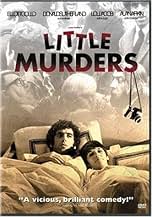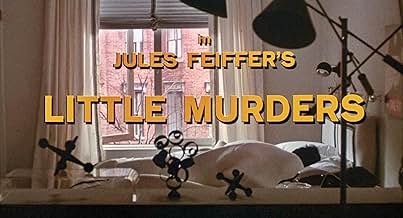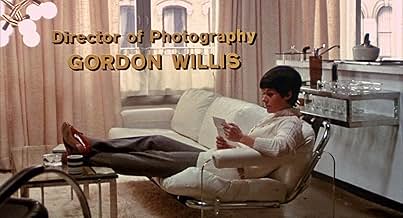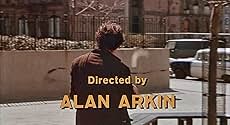Ajouter une intrigue dans votre langueDark comedy where Alfred Chamberlain copes with urban violence, obscene phone calls, rusty water pipes, electrical blackouts, paranoia, and racial conflict during a 1970's summer as he gets ... Tout lireDark comedy where Alfred Chamberlain copes with urban violence, obscene phone calls, rusty water pipes, electrical blackouts, paranoia, and racial conflict during a 1970's summer as he gets to know his girlfriend Patsy Newquist's family.Dark comedy where Alfred Chamberlain copes with urban violence, obscene phone calls, rusty water pipes, electrical blackouts, paranoia, and racial conflict during a 1970's summer as he gets to know his girlfriend Patsy Newquist's family.
- Récompenses
- 1 nomination au total
- Checkpoint Police Officer
- (non crédité)
Avis à la une
While I found it less funny during a recent viewing than I remembered, the message was still disturbing and contemporary. It is certainly satire and black comedy, but you often lose yourself in the story. It is a very individual film, different people will laugh at different times and at different things. During a theater viewing it seemed to isolate audience members from each other.
Jules Feiffer's screenplay is about Alfred (Elliot Gould), a NYC photographer and self- described "apathist", sort of an unengaged existentialist. He is completely disillusioned and has deadened himself to the cries, smells, sights and pains of violent city living; in a Big Apple even more adversarial than that of "The Out-Of-Towners".
Alfred can't feel much anymore but he takes an interest in Patsy (Marcia Rodd), a controlling interior decorator optimist, who wants to change him. Patsy has been able to stay upbeat and involved despite daily encounters with muggers, snipers, obscene callers, and a family that leaves a lot to be desired.
The film seems to be saying that harsh urban life cuts its people off from gentler human emotion. As an interior decorator Patsy's life is largely defined by her ability to control her possessions and the attitudes of those around her.
Patsy's father, mother and younger brother are living a painful parody of "family life," and Alfred's weirdness eventually allows him to fit right in. The dinner scene where he first meets her family is one of the funniest in film history.
The film illustrates that neither apathy nor constructive engagement are successful mechanisms for coping with the modern world. It seems to be saying that the only rational response to living in an insane environment is to vigorously participate in the insanity.
Then again, what do I know? I'm only a child.
The pulse of this movie is subversive and menacing, and even though there are many, many great laughs, I think the classification of it as a comedy is wrong. It never feels like a comedy. In terms of tone, it is something like the pilot for Twin Peaks and a Mamet play and an Odets play, but with some strange off off off off Broadway claustrophobia and seventies nihilistic horror. It displays a collapsed and paranoid urban environment in which people are combative with words and isolated by them.
I feel it should be essential viewing for any writer, as it contains four of the best-- if not the actual four best-- monologues I've ever heard in a movie. Arkin and Sutherland have amazing monologues that are only marginally upstaged by those given by Gould and Jacobi.
I laughed many, many times (as did many people in the sold out screening I attended), but when it ended, the haunting and thoughtful core of the movie lingered more than did the comedy.
A rich and allegorical piece that deserves serious study and accolades.
(I saw a 35mm print of the movie at Film Forum, N.Y.)
I saw this film and then read the play it was based on, and both give off the same claustrophobic air of desperation while still being side-splittingly funny. It is definitely worth hunting down. In the words of Father Dupas, it is "all right."
I think that my two favorite scenes are the appearances of Sutherland and Arkin. Sutherland plays a priest who seems to be a cross between Sutherland's characters from "MASH" and "Kelly's Heroes"; Arkin plays a detective who spouts out the craziest monologue explaining why there's a conspiracy behind the murders. Overall, this is very much a New York kind of movie. I should identify that there are several very long scenes during the movie, but it's certainly not a flick that you'll forget anytime soon. Impressive.
Le saviez-vous
- AnecdotesAfter seeing the film, Jean Renoir wrote to Alan Arkin, telling him "this film will never be forgotten".
- Citations
Rev. Dupas: Why does one decide to marry? Social pressure? Boredom? Loneliness? Sexual appeasement? Love? I won't put any of these reasons down. Each in its own way is adequate, each is all right. Last year, I married a musician who wanted to get married in order to stop masturbating. Please, don't be startled, I'm not putting him down. That marriage did not work. But the man tried. He is now separated, still masturbating, but he is at peace with himself because he tried society's way.
- Versions alternativesOriginally rated 'R' when released in the U.S in 1971. In 1973 the film was cut to be re-rated 'PG' for a re-release.
- ConnexionsFeatured in Alan Arkin: Live from the TCM Classic Film Festival (2015)
- Bandes originalesSkating In Central Park
Composed by John Lewis
Performed by The Modern Jazz Quartet
Through the courtesy of United Artists Records, Inc.
Meilleurs choix
- How long is Little Murders?Alimenté par Alexa
Détails
- Date de sortie
- Pays d’origine
- Langue
- Aussi connu sous le nom de
- Little Murders
- Lieux de tournage
- Brooklyn Boro Hall Court, Ville de New York, New York, États-Unis(courtroom sequence)
- Sociétés de production
- Voir plus de crédits d'entreprise sur IMDbPro
Box-office
- Budget
- 1 340 000 $US (estimé)
- Durée1 heure 48 minutes
- Couleur
- Rapport de forme
- 1.85 : 1
Contribuer à cette page
































